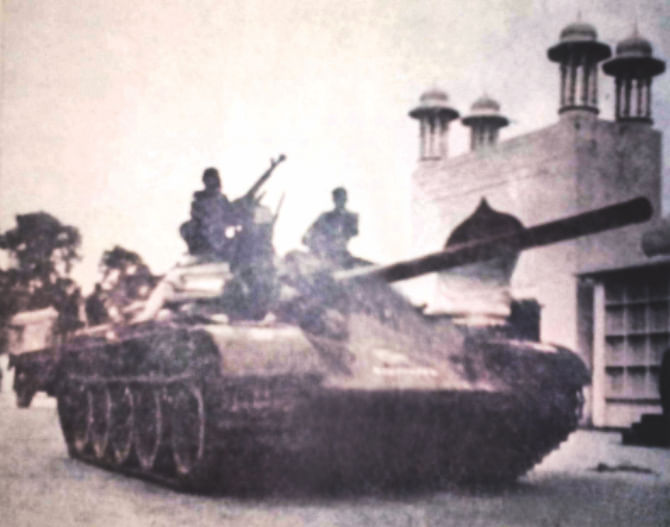Trial possible; no initiative taken
Trial possible; no initiative taken

Around 14 years ago, the then chief of staff and the judge advocate general of the army expressed the opinion that army personnel involved in the August 15 gruesome killings could also be tried on the charge of mutiny under army law.
They gave the opinion on December 4, 2000 at a meeting of the parliamentary standing committee on the defence ministry in the seventh parliament [1996-2001], according to the meeting's proceedings.
Members of the parliamentary body at the meeting were discussing holding trial for the mutiny staged on that fateful day by a few hundred disgruntled junior army officers and soldiers through violating army rules and discipline.
They brutally assassinated President Bangabandhu Sheikh Mujibur Rahman and most of his family members, overthrew his government and installed Khandaker Moshtaque Ahmed as the president.
Setting the discussion into motion, Col (retd) Shawkat Ali, a member of the committee, proposed: "The defence ministry could be asked to take measures for holding the trial of those army personnel who staged the mutiny and committed the killings."
Supporting Shawkat, another member, Lt Col (retd) Faruk Khan, said a trial related to mutiny was held after the assassination of President Ziaur Rahman in 1981 by some army officers.
"But the issue of mutiny involved in the assassination of Father of the Nation Bangabandhu Sheikh Mujibur Rahman was never raised," he regretted.
The then chief of army staff, Gen Mustafizur Rahman, said there was still scope to hold the trial for mutiny. He urged the then judge advocate general, who was a senior army officer and expert on military laws and regulations, to speak in detail about it.
The judge advocate general supported the views of Gen Mustafiz. He said the trial for the Bangabandhu killing was being held in the civil court after the scrapping of the Indemnity Ordinance of 1975. "But the trial for mutiny was not held," he added.
The indemnity ordinance promulgated by president Khandaker Moshtaque on September 26, 1975, indemnified the killers of Bangabandhu and imposed a bar on taking of any legal or disciplinary action against those who were involved in the mutiny.
The Awami League-led government scrapped the Indemnity Ordinance in 1996 and began the trial of Bangabandhu's killers in a civil court. The trial was eventually completed with death penalty given to 12 convicts. Of them, five were hanged in early 2010, six are on the run and one has died.
However, after the discussion, the parliamentary body asked the defence ministry to come up with a detailed report elaborating action, if any, taken against the personnel involved in the August 15 incident.
The ministry was also asked to inform the committee whether any measure had been taken regarding the army personnel who were victimised on the day.
The committee, however, could not follow up on the suggestions due to constraints of time. Within a few months of the meeting, parliament was dissolved.
"We did not have time to make progress as the tenure of the then parliament came to an end," Gen KM Shafiullah, chief of the parliamentary body, told The Daily Star on Saturday.
In the eighth parliament [2001-2006] dominated by the BNP, the parliamentary standing committee on the defence ministry never discussed the issue. Interestingly, the parliamentary body in the ninth parliament [2009-2014] followed in the footsteps of its immediate predecessor.
Shafiullah, who was army chief until Gen Zia replaced him on August 24, 1975, however, said it was possible to hold the trial on charge of mutiny if the government had made the move.
Major General (retd) Moinul Hossain Chowdhury, who was acting as adjutant general of the army after August 15 and was later appointed adjutant general, in his book, "Silent Witness of a General", said there was no move to contain the mutiny.
In his view, those who began the mutiny and those who inspired it and those who were present and did not use force to contain the unruly army personnel would have faced charges in connection with the mutiny had there been any move to try them by court martial.